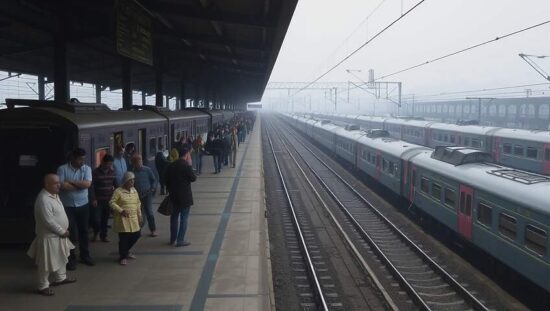The German rail network, operated by Deutsche Bahn (DB), experienced unprecedented levels of unpunctuality in October 2025, raising serious questions about the state of the country’s infrastructure and the government’s investment priorities. According to figures confirmed by DB, just 51.5% of Intercity Express (ICE) and Intercity (IC) trains arrived on time last month, representing a significant deterioration from the previous record low of 55.3% recorded in September. DB’s definition of “on time” permits a delay of up to five minutes and 59 seconds.
The primary culprits behind the escalating delays, consistently cited by DB, are the deteriorating condition of the rail infrastructure and the resultant necessity for extensive, ongoing construction work. These circumstances are compounded by short-notice technical issues, including failures in signaling and overhead power lines, alongside unforeseen “external factors” such as adverse weather conditions. Crucially, these factors are exacerbating what many critics describe as a severely overstressed network, offering minimal margin for error and swiftly leading to cascading delays when disruptions occur. A DB spokesperson acknowledged that “train congestion quickly impacts the entire network and affects punctuality nationwide.
Analysis of daily punctuality figures, reported by “Süddeutsche Zeitung”, reveals stark variations. While weekend services demonstrably outperform weekday performance, often seeing punctuality rates 10-15 percentage points higher, the data also highlights dramatic instances of failure. Travelers on October 23rd and 24th endured particularly severe disruptions, with punctuality plummeting to a dismal 37.2%.
The lack of resilience within the German rail system is drawing increased political scrutiny. Opposition parties are accusing the ruling coalition of underinvestment in infrastructure maintenance and modernization, pointing to the continued reliance on aging systems and inadequate network capacity. Experts suggest that the current situation reflects a systemic problem – a short-term focus on operational efficiency at the expense of long-term infrastructure health. The persistent delays are not merely an inconvenience for passengers; they represent a tangible drag on the German economy, hampering logistics and impacting business operations. The unfolding crisis demands a comprehensive reassessment of rail infrastructure investment strategies and a commitment to prioritizing preventative maintenance to avoid further deterioration of a vital national asset.





